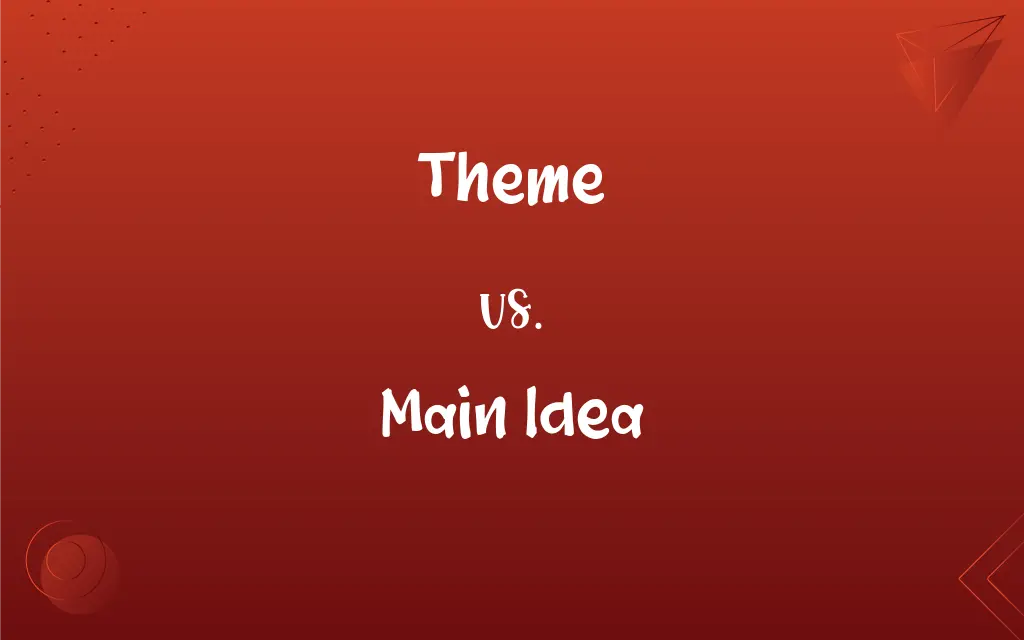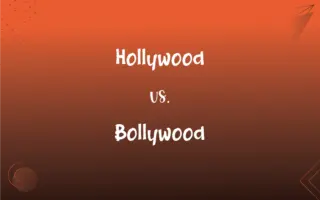Theme vs. Main Idea: What's the Difference?
Edited by Aimie Carlson || By Harlon Moss || Updated on October 9, 2023
Theme is the underlying message or moral in a text, while the main idea is what the text is mostly about. Both interact but operate on different levels in literature or any informative text.

Key Differences
In literature and informational texts, the distinction between theme and main idea serves to extract different aspects of the text. Theme dives into the deeper, underlying message or moral that the author seeks to convey, usually a universal idea that transcends the specific details of the text. Main idea, on the other hand, is the primary point or concept that the author seeks to convey, often summarized by focusing on the general topic or key details provided in the text.
An approach towards comprehending theme typically demands one to look beyond the explicit, exploring how characters, events, and contexts intertwine to form a cohesive, often subtle, moral or lesson. The main idea, conversely, can generally be deciphered by zooming into the core content of the text, determining what the author is specifically discussing or describing, without requiring a deeper interpretation of the text’s broader implications or meanings.
Themes, weaving through narratives and arguments, are rarely stated explicitly and usually warrant an interpretative lens to be understood and articulated. They simmer below the surface, requiring a contemplation of character developments, conflicts, and resolutions. The main idea tends to be more accessible, often being stated directly or being deducible through a collective look at the pertinent facts, arguments, or descriptions provided within the text.
Delving into theme requires one to amalgamate various elements of the text, piecing together facets like character arcs, plot points, and literary devices to unearth a generalized, pervasive message. The main idea steers clear of this complexity to a degree, offering a straightforward insight into what the text is about, often encapsulated in key details or a central message that overtly threads through the text.
Theme, as a concept, often finds consistency across various instances, be it different stories or informational texts, forming a recurrent concept or message that can be identified across various contexts and narratives. The main idea, while pivotal, often remains confined to the specific text it pertains to, offering a snapshot into the author’s specific intent, topic, or message in that particular context.
ADVERTISEMENT
Comparison Chart
Definition
Underlying message or moral
Primary point or concept
Explicitness
Usually implicit
Often explicit
Universality
Can be universal across texts
Specific to the text
Relation to Text
Derived from various text elements
Directly stated or easily deduced
Level of Interpretation
Requires deeper interpretation
Can usually be identified without depth
ADVERTISEMENT
Theme and Main Idea Definitions
Theme
The Moral Undercurrent
The theme of redemption threads through the protagonist's journey.
Main Idea
Pivotal Subject Matter
The main idea of the chapter emphasizes the necessity of effective communication.
Theme
An Implied Message
The theme of sacrifice was evident through the character’s actions.
Main Idea
The Core Message
The main idea of the story is the friendship between the two protagonists.
Theme
The Implicit Teaching
Through tragic tales, the theme often conveys the folly of hubris.
Main Idea
The Central Thought
The main idea of the article was the impact of climate change on polar bears.
Theme
A Pervasive Undertone
The struggle between good and evil was a consistent theme in the novel.
Main Idea
A Fundamental Concept
The report’s main idea revolves around the economic benefits of renewable energy.
Theme
A Recurrent Concept
Across various tales, the theme of love conquers all appears repeatedly.
Main Idea
The Primary Argument
His speech’s main idea focused on the importance of free speech in democracy.
Theme
A topic of discourse or discussion.
Theme
A subject of artistic representation.
Theme
An implicit or recurrent idea; a motif
A party with a tropical island theme.
FAQs
Can a text have more than one theme?
Yes, a text can explore multiple themes.
Is the main idea always explicitly stated?
No, sometimes the main idea is implied and must be inferred.
Can the theme be unrelated to the main idea?
Generally, the theme and main idea are interconnected, with the theme providing a deeper exploration of the main idea.
Can the theme and main idea be the same in a text?
They might be closely related but the theme tends to be deeper and more universal, while the main idea is specific to the text.
Is it necessary for a text to have a theme?
Not always, especially in non-fiction, a theme may not be present or emphasized.
How do I identify a theme in a text?
Look for recurring concepts, character development, and underlying messages that provide a deeper moral or message.
How is the theme developed in a text?
Through character arcs, plot development, conflict, and resolution, with recurring motifs and symbols.
Should the main idea be obvious to the reader?
Generally, yes, the main idea should be clear and discernible to effectively communicate the text's central point.
Can a theme change within a story?
Yes, themes can evolve or shift as the story progresses.
Does the main idea always involve all characters in a story?
No, some characters might not be directly related to the main idea.
How is the theme different in a novel vs. a short story?
In a novel, themes might develop more slowly and could be more complex due to length, while in a short story, themes are often more immediately clear and singular.
Can main ideas be misinterpreted?
Yes, if context and details aren’t carefully considered, misinterpretations can occur.
Can a theme be stated explicitly?
While themes are often implied, they can be explicitly stated, especially in moralistic tales.
How detailed should the main idea be?
The main idea should be succinct yet comprehensive enough to convey the key point of the text.
How can theme and main idea be misaligned?
They might diverge if the explicit content (main idea) does not clearly mirror or delve into the deeper, implied message (theme).
Is the main idea found only in the introduction?
No, the main idea can be found or developed anywhere in the text.
Can different readers identify different main ideas?
It’s possible, especially in complex texts, but usually, the main idea should be relatively consistent among readers.
Does the main idea have to be a complete sentence?
Typically, yes, to clearly convey what the text is mostly about.
Are themes only found in fictional texts?
No, themes can also be present in non-fiction, offering universal insights or messages.
How does the main idea relate to the summary?
A summary should encapsulate the main idea, providing a condensed version of it.
About Author
Written by
Harlon MossHarlon is a seasoned quality moderator and accomplished content writer for Difference Wiki. An alumnus of the prestigious University of California, he earned his degree in Computer Science. Leveraging his academic background, Harlon brings a meticulous and informed perspective to his work, ensuring content accuracy and excellence.
Edited by
Aimie CarlsonAimie Carlson, holding a master's degree in English literature, is a fervent English language enthusiast. She lends her writing talents to Difference Wiki, a prominent website that specializes in comparisons, offering readers insightful analyses that both captivate and inform.































































